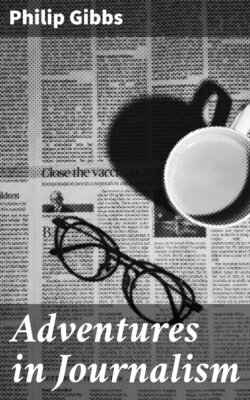Читать книгу Adventures in Journalism - Philip Gibbs - Страница 6
На сайте Литреса книга снята с продажи.
ОглавлениеThe Prince did a real job out there, and though, as an officer on the “Q” side of the Guards, he was not supposed to go into the danger zone, he was constantly in forward places which were not what the Tommies called “health resorts.” I met him one day going into Vermelles, which was a very ugly place indeed, with death on the prowl amid its ruins. He and a Divisional General left their car on the edge of the ruins while they walked forward, and, on their return, found that their poor chauffeur had had his head blown off.
Another time when the King saw a little of the “real thing” was when he visited the Guards in their camp behind the lines near Pilkem. Their headquarters were in an old monastery, and the King and the officers took tea in the garden, while the band of the Grenadiers played selections from Gilbert and Sullivan. I remember it was when they were playing “Dear Little Buttercup” that three German aëroplanes came overhead, flying very low. To our imagination they seemed to be searching for the King, and we expected at any moment they would unload their bombs upon his tea table and his body. Our anti-aircraft guns immediately opened fire, and there was a shrieking of three-inch shells until the blue sky was all dappled with the white puffs of the “Archies.” The enemy planes circled round, had a good look, and then flew away without dropping a bomb, much to our relief, for one good-sized bomb would have made a horrible mess in the Guards’ camp, and might have killed the King.
That afternoon I was trapped into a little conspiracy against the King by the old abbot of the monastery. He was immensely anxious for the King to sign the visitors’ book, but the officers put the old man off by various excuses. Feeling sorry for his disappointment, I promised to say a word to the King’s aide-de-camp, and advised the old gentleman to intercept the King down the only path he could use on his way out, carrying the great leather book, and a pen and ink, so that there would be no escape. This little plot succeeded, to the huge delight of the abbot, and the monks who afterward gave me their united blessings.
On the King’s first visit to the army in France, a most unfortunate accident happened to him, which was very painful and serious. He was reviewing part of the Air Force on a road out of Béthune, mounted on a horse which ought to have been proof against all the noise of military maneuvers. But it was too much for the animal’s nerves when, at the conclusion of the review, the silent lines of men suddenly broke into deafening cheers. The horse reared three times, and the King kept his seat perfectly. But the third time, owing to the greasy mud, the horse slipped and fell sideways, rolling over the King. Generals dismounted, and ran to where he lay motionless and a little stunned. They picked him up and put him into his motor car, where he sat back feebly, and with a look of great pain. I happened to be standing on a bank immediately opposite, and one of the King’s A.D.C.’s, greatly excited, ran up to me and said: “Tell the men not to cheer!” It was impossible for me, as a war correspondent, to give any such order, and, indeed, it was too late, for when the King’s car moved down the road, the other men, who had not seen the accident, cheered with immense volleys of enthusiastic noise.
The King tried to raise his hand to the salute, but had not the strength. He had been badly strained, suffered acute pain, and that night was in a high fever. On the following day I saw him taken away in an ambulance, like an ordinary casualty, and no soldiers in the little old town of Béthune knew that it was the King of England who was passing by.
Before the end of his second visit, the King received the five war correspondents who had followed the fortunes of the British Armies in France through all their great battles, and he spoke kind words to us which we were glad to hear.
